An Analysis of the Major Causes of the Nagorno-Karabakh Conflict
VerifiedAdded on 2021/06/07
|9
|2661
|199
Essay
AI Summary
This essay provides an in-depth analysis of the Nagorno-Karabakh conflict, identifying and categorizing its primary causes. The essay examines regional factors, including the impact of Soviet-Turkey relations and Moscow's double standards. It delves into socio-psychological causes, such as the security dilemma from Azerbaijan's perspective, historical perceptions of Turkic nations, the role of the Armenian diaspora, religious and cultural differences, and the existential nature of the issue. Finally, it considers the state-level cause of the absence of a stalemate. The essay argues that a complex interplay of these factors has contributed to the conflict's emergence and exacerbation, hindering peaceful resolutions. The author emphasizes the importance of understanding these multifaceted causes for developing effective solutions.
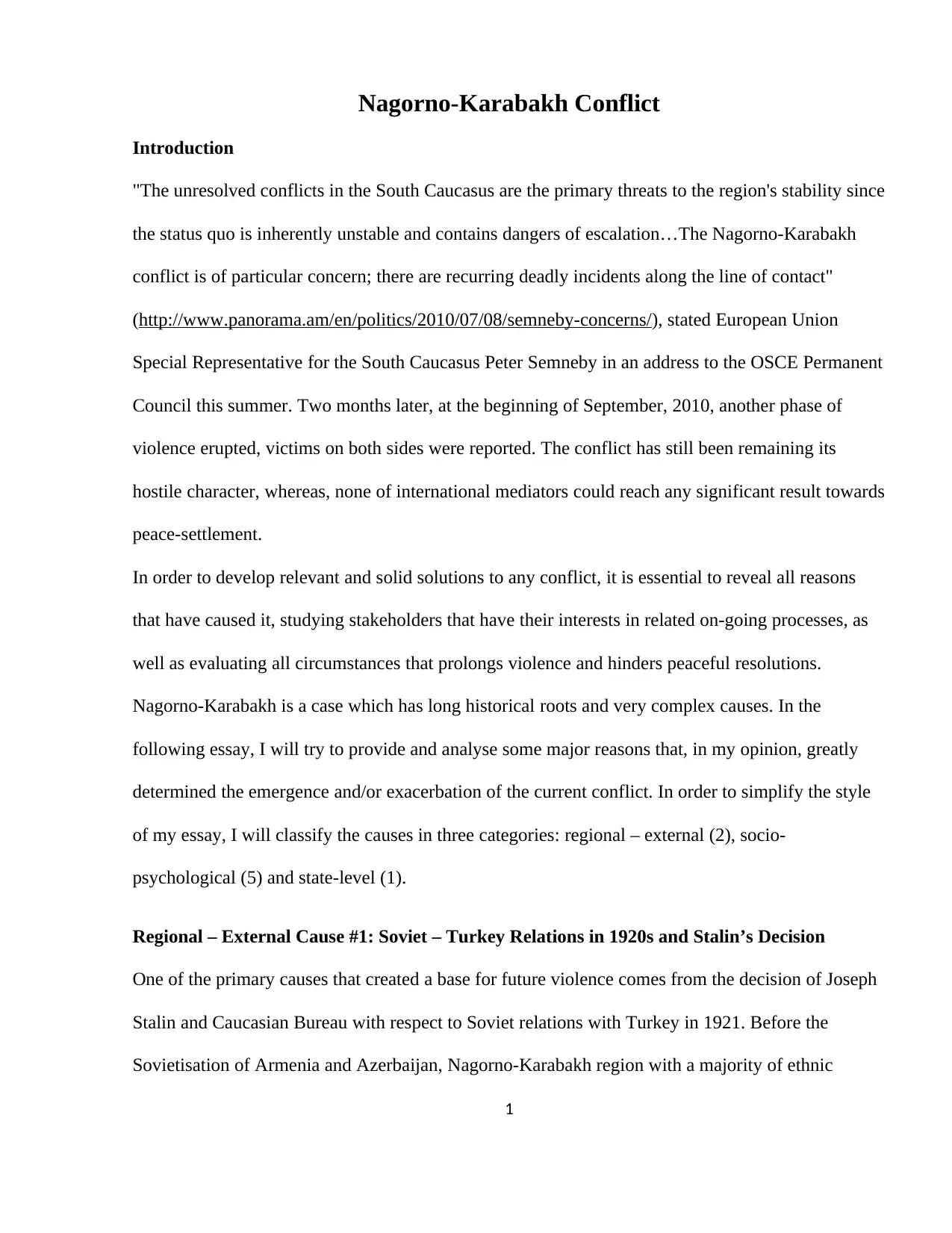
Nagorno-Karabakh Conflict
Introduction
"The unresolved conflicts in the South Caucasus are the primary threats to the region's stability since
the status quo is inherently unstable and contains dangers of escalation…The Nagorno-Karabakh
conflict is of particular concern; there are recurring deadly incidents along the line of contact"
(http://www.panorama.am/en/politics/2010/07/08/semneby-concerns/), stated European Union
Special Representative for the South Caucasus Peter Semneby in an address to the OSCE Permanent
Council this summer. Two months later, at the beginning of September, 2010, another phase of
violence erupted, victims on both sides were reported. The conflict has still been remaining its
hostile character, whereas, none of international mediators could reach any significant result towards
peace-settlement.
In order to develop relevant and solid solutions to any conflict, it is essential to reveal all reasons
that have caused it, studying stakeholders that have their interests in related on-going processes, as
well as evaluating all circumstances that prolongs violence and hinders peaceful resolutions.
Nagorno-Karabakh is a case which has long historical roots and very complex causes. In the
following essay, I will try to provide and analyse some major reasons that, in my opinion, greatly
determined the emergence and/or exacerbation of the current conflict. In order to simplify the style
of my essay, I will classify the causes in three categories: regional – external (2), socio-
psychological (5) and state-level (1).
Regional – External Cause #1: Soviet – Turkey Relations in 1920s and Stalin’s Decision
One of the primary causes that created a base for future violence comes from the decision of Joseph
Stalin and Caucasian Bureau with respect to Soviet relations with Turkey in 1921. Before the
Sovietisation of Armenia and Azerbaijan, Nagorno-Karabakh region with a majority of ethnic
1
Introduction
"The unresolved conflicts in the South Caucasus are the primary threats to the region's stability since
the status quo is inherently unstable and contains dangers of escalation…The Nagorno-Karabakh
conflict is of particular concern; there are recurring deadly incidents along the line of contact"
(http://www.panorama.am/en/politics/2010/07/08/semneby-concerns/), stated European Union
Special Representative for the South Caucasus Peter Semneby in an address to the OSCE Permanent
Council this summer. Two months later, at the beginning of September, 2010, another phase of
violence erupted, victims on both sides were reported. The conflict has still been remaining its
hostile character, whereas, none of international mediators could reach any significant result towards
peace-settlement.
In order to develop relevant and solid solutions to any conflict, it is essential to reveal all reasons
that have caused it, studying stakeholders that have their interests in related on-going processes, as
well as evaluating all circumstances that prolongs violence and hinders peaceful resolutions.
Nagorno-Karabakh is a case which has long historical roots and very complex causes. In the
following essay, I will try to provide and analyse some major reasons that, in my opinion, greatly
determined the emergence and/or exacerbation of the current conflict. In order to simplify the style
of my essay, I will classify the causes in three categories: regional – external (2), socio-
psychological (5) and state-level (1).
Regional – External Cause #1: Soviet – Turkey Relations in 1920s and Stalin’s Decision
One of the primary causes that created a base for future violence comes from the decision of Joseph
Stalin and Caucasian Bureau with respect to Soviet relations with Turkey in 1921. Before the
Sovietisation of Armenia and Azerbaijan, Nagorno-Karabakh region with a majority of ethnic
1
Paraphrase This Document
Need a fresh take? Get an instant paraphrase of this document with our AI Paraphraser
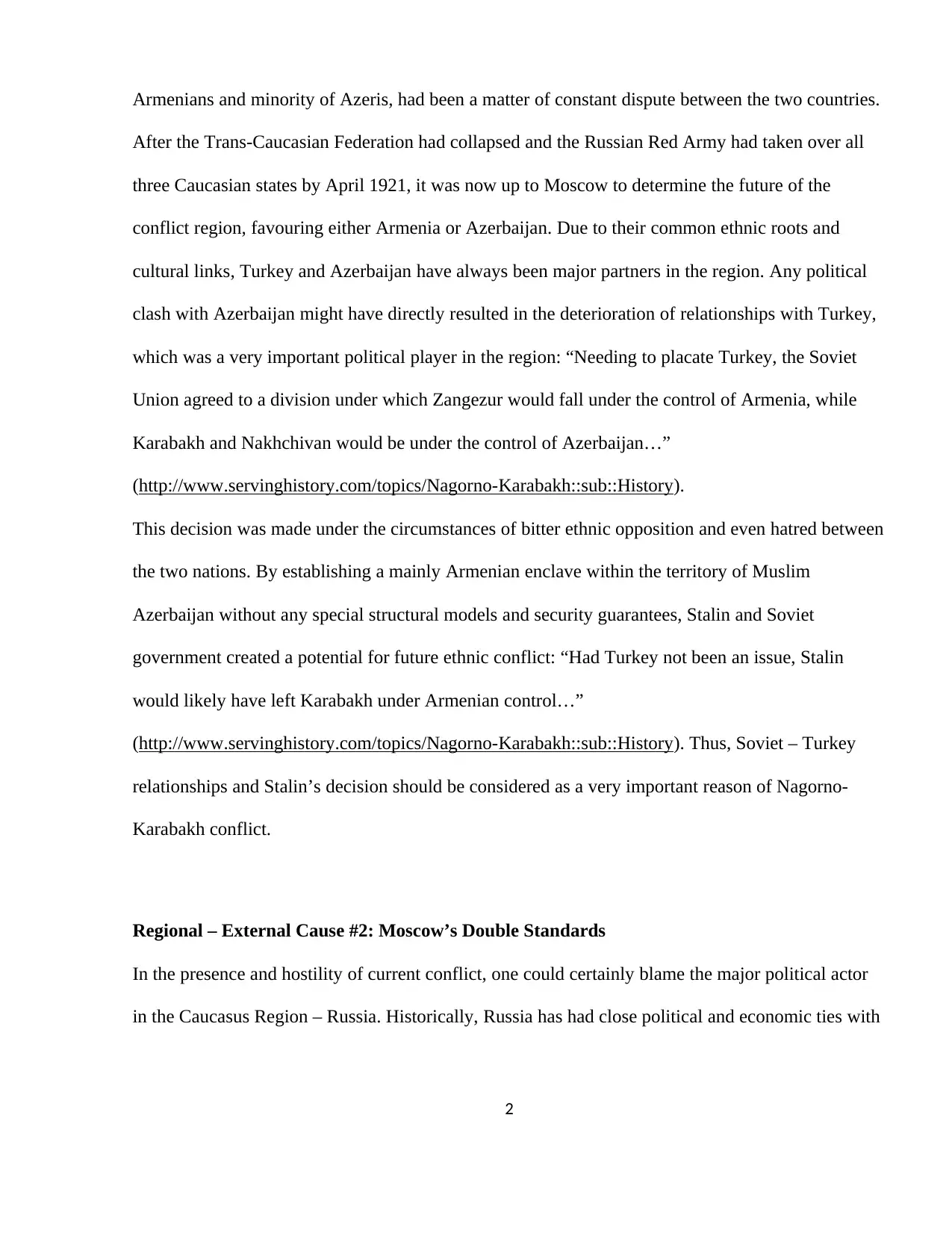
Armenians and minority of Azeris, had been a matter of constant dispute between the two countries.
After the Trans-Caucasian Federation had collapsed and the Russian Red Army had taken over all
three Caucasian states by April 1921, it was now up to Moscow to determine the future of the
conflict region, favouring either Armenia or Azerbaijan. Due to their common ethnic roots and
cultural links, Turkey and Azerbaijan have always been major partners in the region. Any political
clash with Azerbaijan might have directly resulted in the deterioration of relationships with Turkey,
which was a very important political player in the region: “Needing to placate Turkey, the Soviet
Union agreed to a division under which Zangezur would fall under the control of Armenia, while
Karabakh and Nakhchivan would be under the control of Azerbaijan…”
(http://www.servinghistory.com/topics/Nagorno-Karabakh::sub::History).
This decision was made under the circumstances of bitter ethnic opposition and even hatred between
the two nations. By establishing a mainly Armenian enclave within the territory of Muslim
Azerbaijan without any special structural models and security guarantees, Stalin and Soviet
government created a potential for future ethnic conflict: “Had Turkey not been an issue, Stalin
would likely have left Karabakh under Armenian control…”
(http://www.servinghistory.com/topics/Nagorno-Karabakh::sub::History). Thus, Soviet – Turkey
relationships and Stalin’s decision should be considered as a very important reason of Nagorno-
Karabakh conflict.
Regional – External Cause #2: Moscow’s Double Standards
In the presence and hostility of current conflict, one could certainly blame the major political actor
in the Caucasus Region – Russia. Historically, Russia has had close political and economic ties with
2
After the Trans-Caucasian Federation had collapsed and the Russian Red Army had taken over all
three Caucasian states by April 1921, it was now up to Moscow to determine the future of the
conflict region, favouring either Armenia or Azerbaijan. Due to their common ethnic roots and
cultural links, Turkey and Azerbaijan have always been major partners in the region. Any political
clash with Azerbaijan might have directly resulted in the deterioration of relationships with Turkey,
which was a very important political player in the region: “Needing to placate Turkey, the Soviet
Union agreed to a division under which Zangezur would fall under the control of Armenia, while
Karabakh and Nakhchivan would be under the control of Azerbaijan…”
(http://www.servinghistory.com/topics/Nagorno-Karabakh::sub::History).
This decision was made under the circumstances of bitter ethnic opposition and even hatred between
the two nations. By establishing a mainly Armenian enclave within the territory of Muslim
Azerbaijan without any special structural models and security guarantees, Stalin and Soviet
government created a potential for future ethnic conflict: “Had Turkey not been an issue, Stalin
would likely have left Karabakh under Armenian control…”
(http://www.servinghistory.com/topics/Nagorno-Karabakh::sub::History). Thus, Soviet – Turkey
relationships and Stalin’s decision should be considered as a very important reason of Nagorno-
Karabakh conflict.
Regional – External Cause #2: Moscow’s Double Standards
In the presence and hostility of current conflict, one could certainly blame the major political actor
in the Caucasus Region – Russia. Historically, Russia has had close political and economic ties with
2
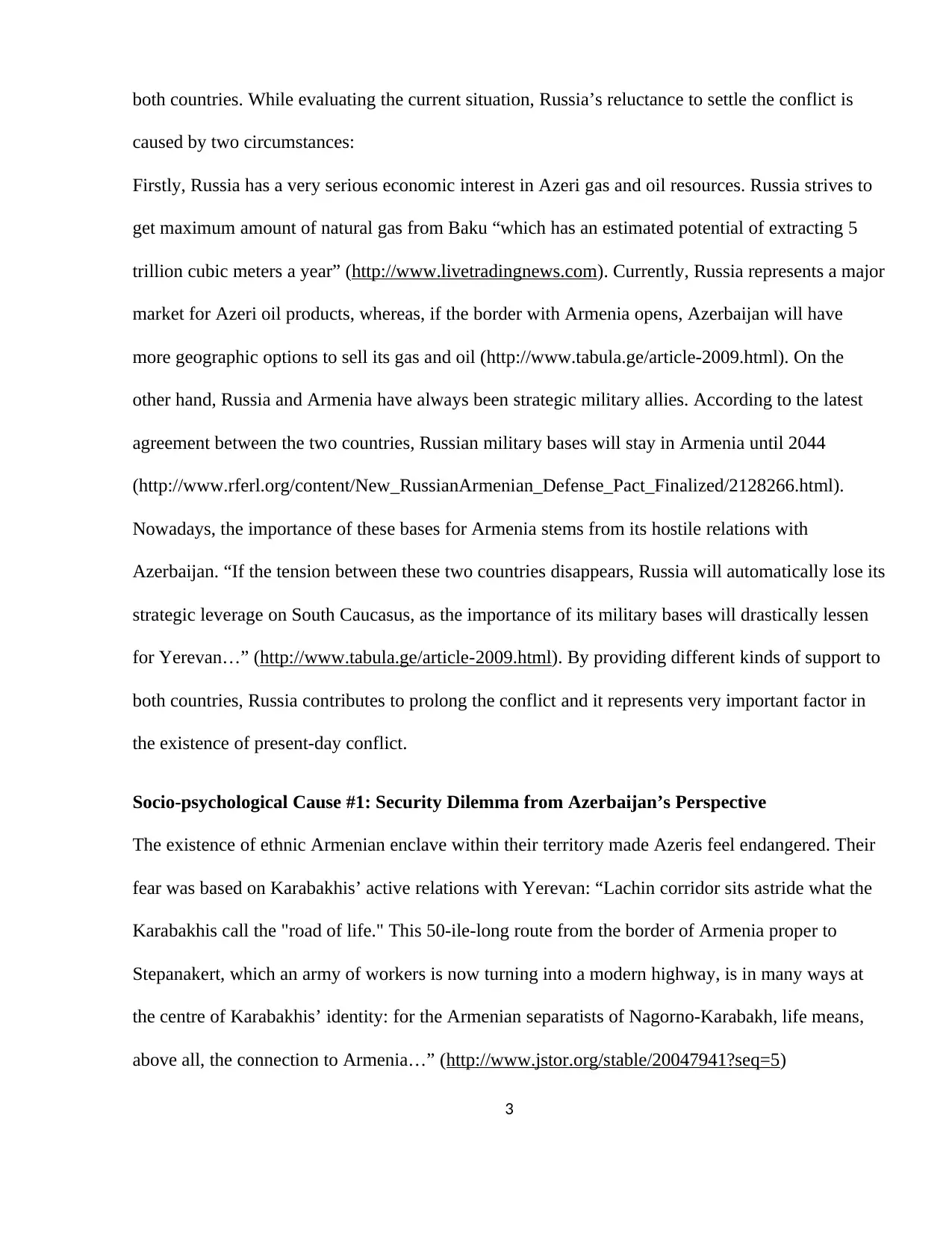
both countries. While evaluating the current situation, Russia’s reluctance to settle the conflict is
caused by two circumstances:
Firstly, Russia has a very serious economic interest in Azeri gas and oil resources. Russia strives to
get maximum amount of natural gas from Baku “which has an estimated potential of extracting 5
trillion cubic meters a year” (http://www.livetradingnews.com). Currently, Russia represents a major
market for Azeri oil products, whereas, if the border with Armenia opens, Azerbaijan will have
more geographic options to sell its gas and oil (http://www.tabula.ge/article-2009.html). On the
other hand, Russia and Armenia have always been strategic military allies. According to the latest
agreement between the two countries, Russian military bases will stay in Armenia until 2044
(http://www.rferl.org/content/New_RussianArmenian_Defense_Pact_Finalized/2128266.html).
Nowadays, the importance of these bases for Armenia stems from its hostile relations with
Azerbaijan. “If the tension between these two countries disappears, Russia will automatically lose its
strategic leverage on South Caucasus, as the importance of its military bases will drastically lessen
for Yerevan…” (http://www.tabula.ge/article-2009.html). By providing different kinds of support to
both countries, Russia contributes to prolong the conflict and it represents very important factor in
the existence of present-day conflict.
Socio-psychological Cause #1: Security Dilemma from Azerbaijan’s Perspective
The existence of ethnic Armenian enclave within their territory made Azeris feel endangered. Their
fear was based on Karabakhis’ active relations with Yerevan: “Lachin corridor sits astride what the
Karabakhis call the "road of life." This 50-ile-long route from the border of Armenia proper to
Stepanakert, which an army of workers is now turning into a modern highway, is in many ways at
the centre of Karabakhis’ identity: for the Armenian separatists of Nagorno-Karabakh, life means,
above all, the connection to Armenia…” (http://www.jstor.org/stable/20047941?seq=5)
3
caused by two circumstances:
Firstly, Russia has a very serious economic interest in Azeri gas and oil resources. Russia strives to
get maximum amount of natural gas from Baku “which has an estimated potential of extracting 5
trillion cubic meters a year” (http://www.livetradingnews.com). Currently, Russia represents a major
market for Azeri oil products, whereas, if the border with Armenia opens, Azerbaijan will have
more geographic options to sell its gas and oil (http://www.tabula.ge/article-2009.html). On the
other hand, Russia and Armenia have always been strategic military allies. According to the latest
agreement between the two countries, Russian military bases will stay in Armenia until 2044
(http://www.rferl.org/content/New_RussianArmenian_Defense_Pact_Finalized/2128266.html).
Nowadays, the importance of these bases for Armenia stems from its hostile relations with
Azerbaijan. “If the tension between these two countries disappears, Russia will automatically lose its
strategic leverage on South Caucasus, as the importance of its military bases will drastically lessen
for Yerevan…” (http://www.tabula.ge/article-2009.html). By providing different kinds of support to
both countries, Russia contributes to prolong the conflict and it represents very important factor in
the existence of present-day conflict.
Socio-psychological Cause #1: Security Dilemma from Azerbaijan’s Perspective
The existence of ethnic Armenian enclave within their territory made Azeris feel endangered. Their
fear was based on Karabakhis’ active relations with Yerevan: “Lachin corridor sits astride what the
Karabakhis call the "road of life." This 50-ile-long route from the border of Armenia proper to
Stepanakert, which an army of workers is now turning into a modern highway, is in many ways at
the centre of Karabakhis’ identity: for the Armenian separatists of Nagorno-Karabakh, life means,
above all, the connection to Armenia…” (http://www.jstor.org/stable/20047941?seq=5)
3
⊘ This is a preview!⊘
Do you want full access?
Subscribe today to unlock all pages.

Trusted by 1+ million students worldwide
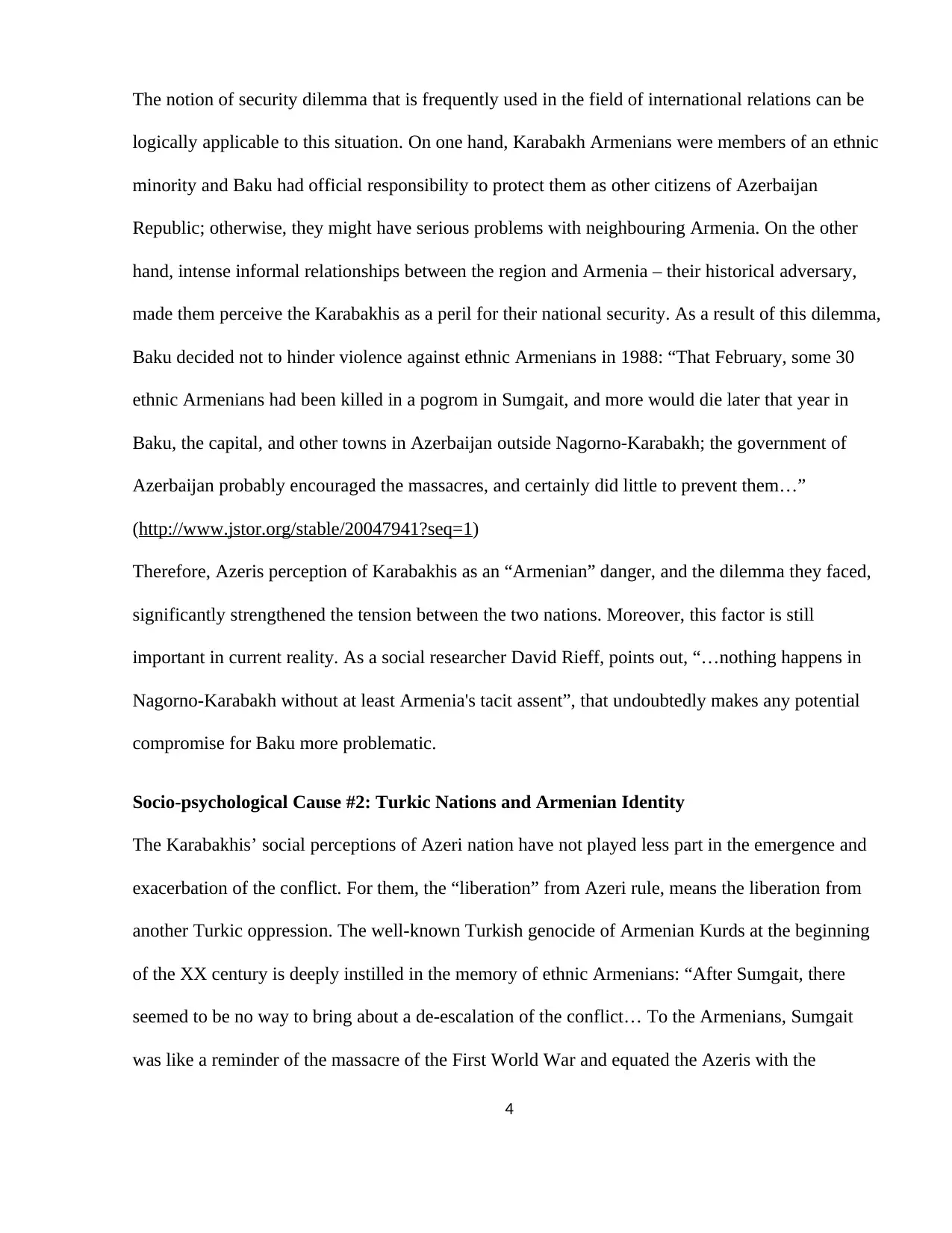
The notion of security dilemma that is frequently used in the field of international relations can be
logically applicable to this situation. On one hand, Karabakh Armenians were members of an ethnic
minority and Baku had official responsibility to protect them as other citizens of Azerbaijan
Republic; otherwise, they might have serious problems with neighbouring Armenia. On the other
hand, intense informal relationships between the region and Armenia – their historical adversary,
made them perceive the Karabakhis as a peril for their national security. As a result of this dilemma,
Baku decided not to hinder violence against ethnic Armenians in 1988: “That February, some 30
ethnic Armenians had been killed in a pogrom in Sumgait, and more would die later that year in
Baku, the capital, and other towns in Azerbaijan outside Nagorno-Karabakh; the government of
Azerbaijan probably encouraged the massacres, and certainly did little to prevent them…”
(http://www.jstor.org/stable/20047941?seq=1)
Therefore, Azeris perception of Karabakhis as an “Armenian” danger, and the dilemma they faced,
significantly strengthened the tension between the two nations. Moreover, this factor is still
important in current reality. As a social researcher David Rieff, points out, “…nothing happens in
Nagorno-Karabakh without at least Armenia's tacit assent”, that undoubtedly makes any potential
compromise for Baku more problematic.
Socio-psychological Cause #2: Turkic Nations and Armenian Identity
The Karabakhis’ social perceptions of Azeri nation have not played less part in the emergence and
exacerbation of the conflict. For them, the “liberation” from Azeri rule, means the liberation from
another Turkic oppression. The well-known Turkish genocide of Armenian Kurds at the beginning
of the XX century is deeply instilled in the memory of ethnic Armenians: “After Sumgait, there
seemed to be no way to bring about a de-escalation of the conflict… To the Armenians, Sumgait
was like a reminder of the massacre of the First World War and equated the Azeris with the
4
logically applicable to this situation. On one hand, Karabakh Armenians were members of an ethnic
minority and Baku had official responsibility to protect them as other citizens of Azerbaijan
Republic; otherwise, they might have serious problems with neighbouring Armenia. On the other
hand, intense informal relationships between the region and Armenia – their historical adversary,
made them perceive the Karabakhis as a peril for their national security. As a result of this dilemma,
Baku decided not to hinder violence against ethnic Armenians in 1988: “That February, some 30
ethnic Armenians had been killed in a pogrom in Sumgait, and more would die later that year in
Baku, the capital, and other towns in Azerbaijan outside Nagorno-Karabakh; the government of
Azerbaijan probably encouraged the massacres, and certainly did little to prevent them…”
(http://www.jstor.org/stable/20047941?seq=1)
Therefore, Azeris perception of Karabakhis as an “Armenian” danger, and the dilemma they faced,
significantly strengthened the tension between the two nations. Moreover, this factor is still
important in current reality. As a social researcher David Rieff, points out, “…nothing happens in
Nagorno-Karabakh without at least Armenia's tacit assent”, that undoubtedly makes any potential
compromise for Baku more problematic.
Socio-psychological Cause #2: Turkic Nations and Armenian Identity
The Karabakhis’ social perceptions of Azeri nation have not played less part in the emergence and
exacerbation of the conflict. For them, the “liberation” from Azeri rule, means the liberation from
another Turkic oppression. The well-known Turkish genocide of Armenian Kurds at the beginning
of the XX century is deeply instilled in the memory of ethnic Armenians: “After Sumgait, there
seemed to be no way to bring about a de-escalation of the conflict… To the Armenians, Sumgait
was like a reminder of the massacre of the First World War and equated the Azeris with the
4
Paraphrase This Document
Need a fresh take? Get an instant paraphrase of this document with our AI Paraphraser
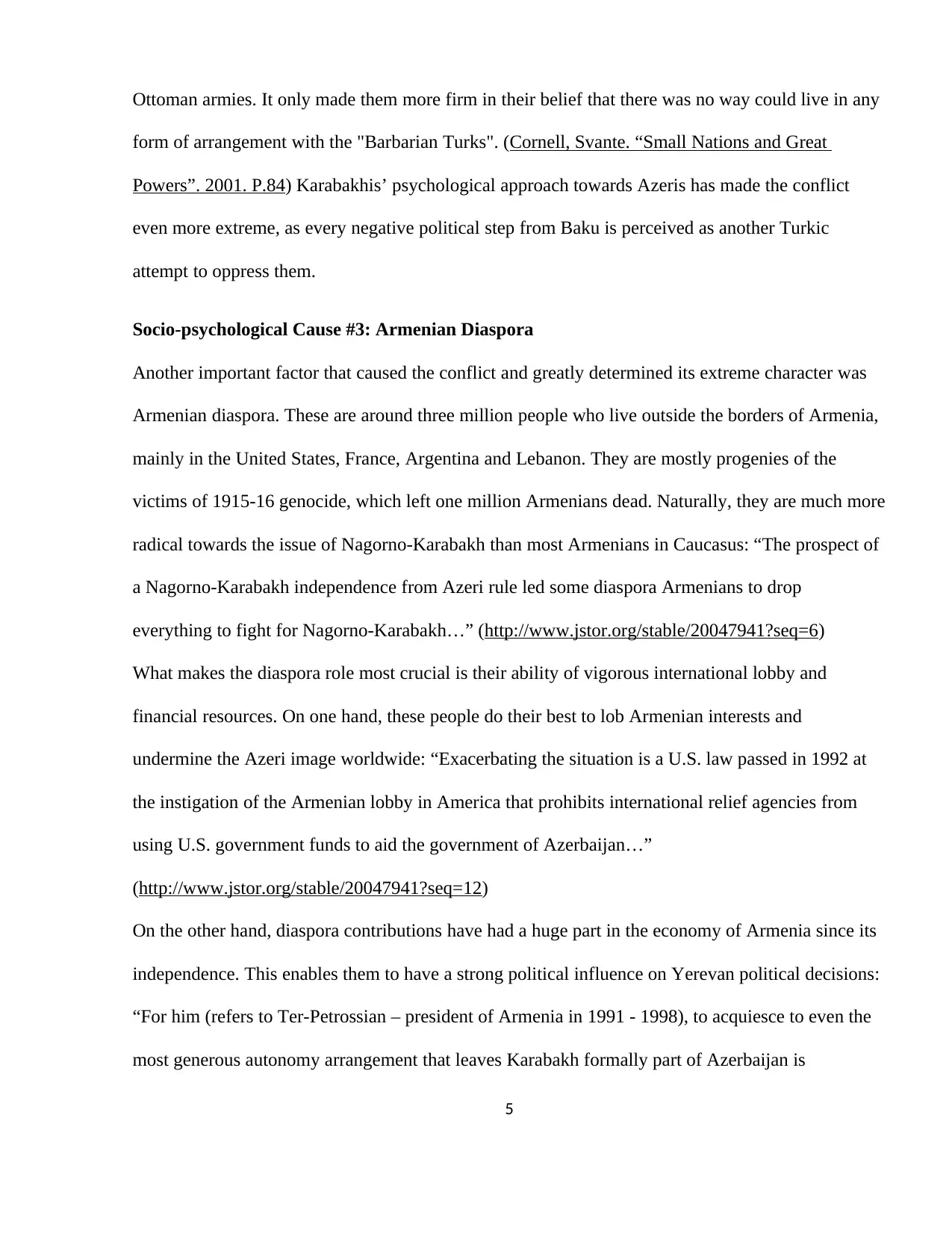
Ottoman armies. It only made them more firm in their belief that there was no way could live in any
form of arrangement with the "Barbarian Turks". (Cornell, Svante. “Small Nations and Great
Powers”. 2001. P.84) Karabakhis’ psychological approach towards Azeris has made the conflict
even more extreme, as every negative political step from Baku is perceived as another Turkic
attempt to oppress them.
Socio-psychological Cause #3: Armenian Diaspora
Another important factor that caused the conflict and greatly determined its extreme character was
Armenian diaspora. These are around three million people who live outside the borders of Armenia,
mainly in the United States, France, Argentina and Lebanon. They are mostly progenies of the
victims of 1915-16 genocide, which left one million Armenians dead. Naturally, they are much more
radical towards the issue of Nagorno-Karabakh than most Armenians in Caucasus: “The prospect of
a Nagorno-Karabakh independence from Azeri rule led some diaspora Armenians to drop
everything to fight for Nagorno-Karabakh…” (http://www.jstor.org/stable/20047941?seq=6)
What makes the diaspora role most crucial is their ability of vigorous international lobby and
financial resources. On one hand, these people do their best to lob Armenian interests and
undermine the Azeri image worldwide: “Exacerbating the situation is a U.S. law passed in 1992 at
the instigation of the Armenian lobby in America that prohibits international relief agencies from
using U.S. government funds to aid the government of Azerbaijan…”
(http://www.jstor.org/stable/20047941?seq=12)
On the other hand, diaspora contributions have had a huge part in the economy of Armenia since its
independence. This enables them to have a strong political influence on Yerevan political decisions:
“For him (refers to Ter-Petrossian – president of Armenia in 1991 - 1998), to acquiesce to even the
most generous autonomy arrangement that leaves Karabakh formally part of Azerbaijan is
5
form of arrangement with the "Barbarian Turks". (Cornell, Svante. “Small Nations and Great
Powers”. 2001. P.84) Karabakhis’ psychological approach towards Azeris has made the conflict
even more extreme, as every negative political step from Baku is perceived as another Turkic
attempt to oppress them.
Socio-psychological Cause #3: Armenian Diaspora
Another important factor that caused the conflict and greatly determined its extreme character was
Armenian diaspora. These are around three million people who live outside the borders of Armenia,
mainly in the United States, France, Argentina and Lebanon. They are mostly progenies of the
victims of 1915-16 genocide, which left one million Armenians dead. Naturally, they are much more
radical towards the issue of Nagorno-Karabakh than most Armenians in Caucasus: “The prospect of
a Nagorno-Karabakh independence from Azeri rule led some diaspora Armenians to drop
everything to fight for Nagorno-Karabakh…” (http://www.jstor.org/stable/20047941?seq=6)
What makes the diaspora role most crucial is their ability of vigorous international lobby and
financial resources. On one hand, these people do their best to lob Armenian interests and
undermine the Azeri image worldwide: “Exacerbating the situation is a U.S. law passed in 1992 at
the instigation of the Armenian lobby in America that prohibits international relief agencies from
using U.S. government funds to aid the government of Azerbaijan…”
(http://www.jstor.org/stable/20047941?seq=12)
On the other hand, diaspora contributions have had a huge part in the economy of Armenia since its
independence. This enables them to have a strong political influence on Yerevan political decisions:
“For him (refers to Ter-Petrossian – president of Armenia in 1991 - 1998), to acquiesce to even the
most generous autonomy arrangement that leaves Karabakh formally part of Azerbaijan is
5
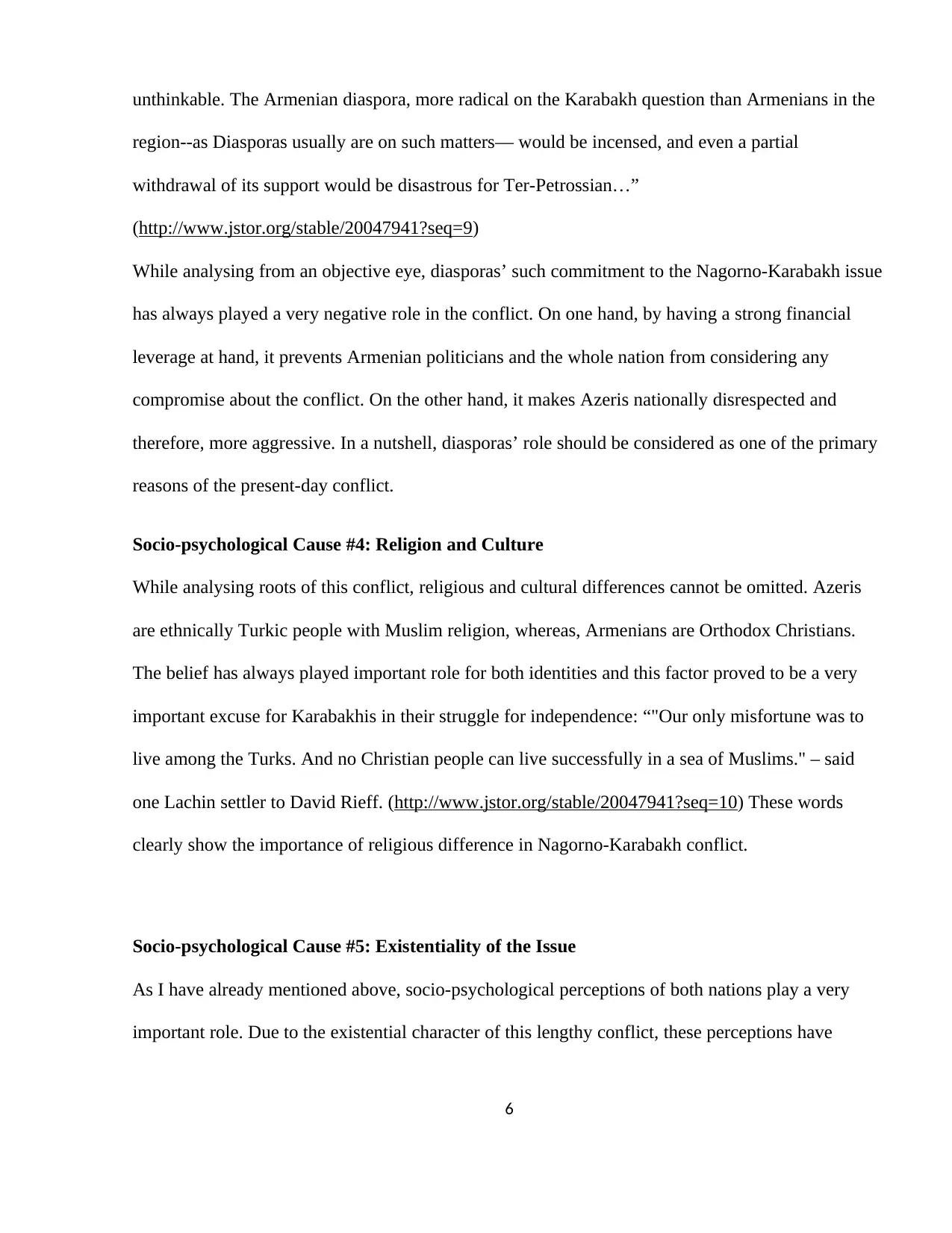
unthinkable. The Armenian diaspora, more radical on the Karabakh question than Armenians in the
region--as Diasporas usually are on such matters— would be incensed, and even a partial
withdrawal of its support would be disastrous for Ter-Petrossian…”
(http://www.jstor.org/stable/20047941?seq=9)
While analysing from an objective eye, diasporas’ such commitment to the Nagorno-Karabakh issue
has always played a very negative role in the conflict. On one hand, by having a strong financial
leverage at hand, it prevents Armenian politicians and the whole nation from considering any
compromise about the conflict. On the other hand, it makes Azeris nationally disrespected and
therefore, more aggressive. In a nutshell, diasporas’ role should be considered as one of the primary
reasons of the present-day conflict.
Socio-psychological Cause #4: Religion and Culture
While analysing roots of this conflict, religious and cultural differences cannot be omitted. Azeris
are ethnically Turkic people with Muslim religion, whereas, Armenians are Orthodox Christians.
The belief has always played important role for both identities and this factor proved to be a very
important excuse for Karabakhis in their struggle for independence: “"Our only misfortune was to
live among the Turks. And no Christian people can live successfully in a sea of Muslims." – said
one Lachin settler to David Rieff. (http://www.jstor.org/stable/20047941?seq=10) These words
clearly show the importance of religious difference in Nagorno-Karabakh conflict.
Socio-psychological Cause #5: Existentiality of the Issue
As I have already mentioned above, socio-psychological perceptions of both nations play a very
important role. Due to the existential character of this lengthy conflict, these perceptions have
6
region--as Diasporas usually are on such matters— would be incensed, and even a partial
withdrawal of its support would be disastrous for Ter-Petrossian…”
(http://www.jstor.org/stable/20047941?seq=9)
While analysing from an objective eye, diasporas’ such commitment to the Nagorno-Karabakh issue
has always played a very negative role in the conflict. On one hand, by having a strong financial
leverage at hand, it prevents Armenian politicians and the whole nation from considering any
compromise about the conflict. On the other hand, it makes Azeris nationally disrespected and
therefore, more aggressive. In a nutshell, diasporas’ role should be considered as one of the primary
reasons of the present-day conflict.
Socio-psychological Cause #4: Religion and Culture
While analysing roots of this conflict, religious and cultural differences cannot be omitted. Azeris
are ethnically Turkic people with Muslim religion, whereas, Armenians are Orthodox Christians.
The belief has always played important role for both identities and this factor proved to be a very
important excuse for Karabakhis in their struggle for independence: “"Our only misfortune was to
live among the Turks. And no Christian people can live successfully in a sea of Muslims." – said
one Lachin settler to David Rieff. (http://www.jstor.org/stable/20047941?seq=10) These words
clearly show the importance of religious difference in Nagorno-Karabakh conflict.
Socio-psychological Cause #5: Existentiality of the Issue
As I have already mentioned above, socio-psychological perceptions of both nations play a very
important role. Due to the existential character of this lengthy conflict, these perceptions have
6
⊘ This is a preview!⊘
Do you want full access?
Subscribe today to unlock all pages.

Trusted by 1+ million students worldwide
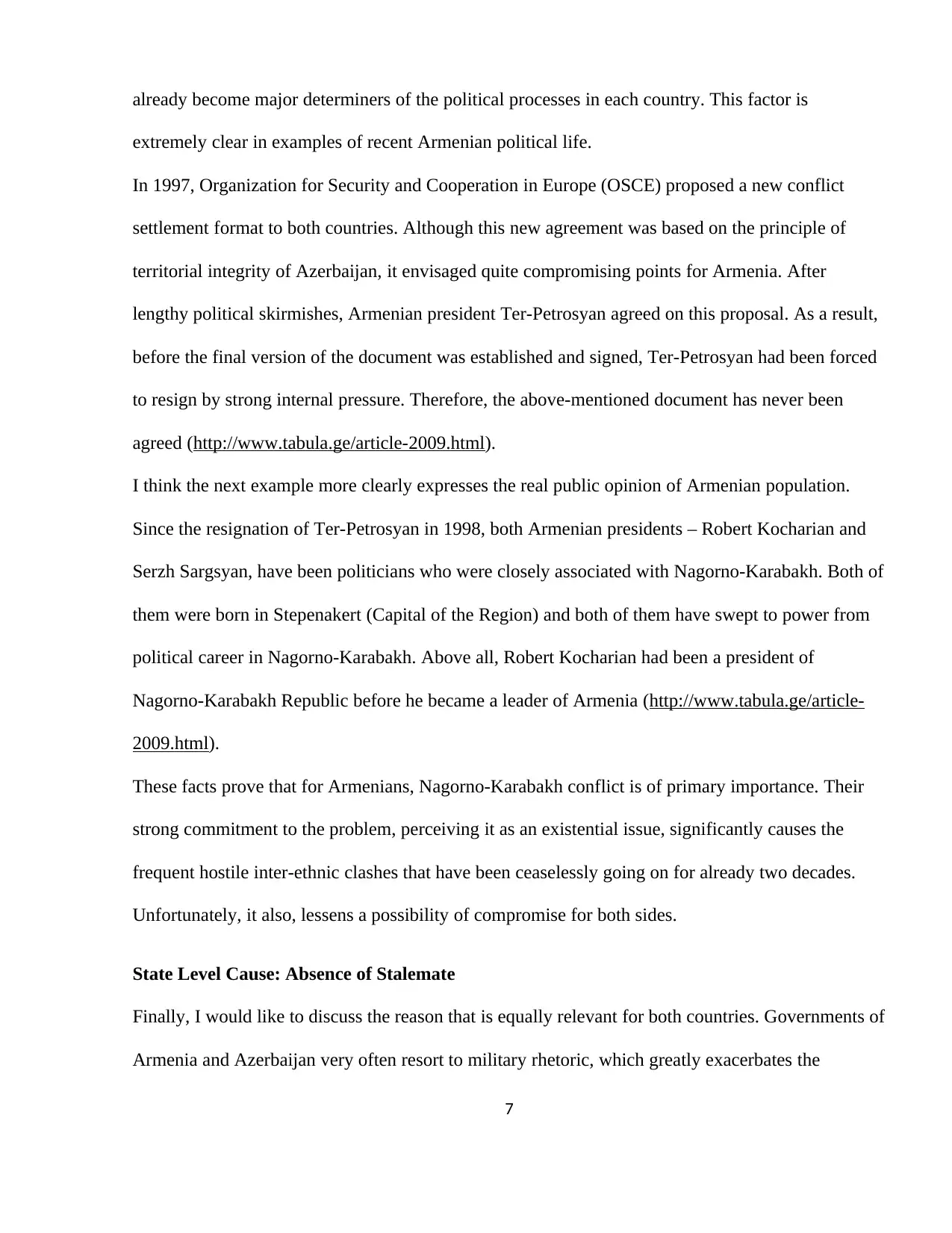
already become major determiners of the political processes in each country. This factor is
extremely clear in examples of recent Armenian political life.
In 1997, Organization for Security and Cooperation in Europe (OSCE) proposed a new conflict
settlement format to both countries. Although this new agreement was based on the principle of
territorial integrity of Azerbaijan, it envisaged quite compromising points for Armenia. After
lengthy political skirmishes, Armenian president Ter-Petrosyan agreed on this proposal. As a result,
before the final version of the document was established and signed, Ter-Petrosyan had been forced
to resign by strong internal pressure. Therefore, the above-mentioned document has never been
agreed (http://www.tabula.ge/article-2009.html).
I think the next example more clearly expresses the real public opinion of Armenian population.
Since the resignation of Ter-Petrosyan in 1998, both Armenian presidents – Robert Kocharian and
Serzh Sargsyan, have been politicians who were closely associated with Nagorno-Karabakh. Both of
them were born in Stepenakert (Capital of the Region) and both of them have swept to power from
political career in Nagorno-Karabakh. Above all, Robert Kocharian had been a president of
Nagorno-Karabakh Republic before he became a leader of Armenia (http://www.tabula.ge/article-
2009.html).
These facts prove that for Armenians, Nagorno-Karabakh conflict is of primary importance. Their
strong commitment to the problem, perceiving it as an existential issue, significantly causes the
frequent hostile inter-ethnic clashes that have been ceaselessly going on for already two decades.
Unfortunately, it also, lessens a possibility of compromise for both sides.
State Level Cause: Absence of Stalemate
Finally, I would like to discuss the reason that is equally relevant for both countries. Governments of
Armenia and Azerbaijan very often resort to military rhetoric, which greatly exacerbates the
7
extremely clear in examples of recent Armenian political life.
In 1997, Organization for Security and Cooperation in Europe (OSCE) proposed a new conflict
settlement format to both countries. Although this new agreement was based on the principle of
territorial integrity of Azerbaijan, it envisaged quite compromising points for Armenia. After
lengthy political skirmishes, Armenian president Ter-Petrosyan agreed on this proposal. As a result,
before the final version of the document was established and signed, Ter-Petrosyan had been forced
to resign by strong internal pressure. Therefore, the above-mentioned document has never been
agreed (http://www.tabula.ge/article-2009.html).
I think the next example more clearly expresses the real public opinion of Armenian population.
Since the resignation of Ter-Petrosyan in 1998, both Armenian presidents – Robert Kocharian and
Serzh Sargsyan, have been politicians who were closely associated with Nagorno-Karabakh. Both of
them were born in Stepenakert (Capital of the Region) and both of them have swept to power from
political career in Nagorno-Karabakh. Above all, Robert Kocharian had been a president of
Nagorno-Karabakh Republic before he became a leader of Armenia (http://www.tabula.ge/article-
2009.html).
These facts prove that for Armenians, Nagorno-Karabakh conflict is of primary importance. Their
strong commitment to the problem, perceiving it as an existential issue, significantly causes the
frequent hostile inter-ethnic clashes that have been ceaselessly going on for already two decades.
Unfortunately, it also, lessens a possibility of compromise for both sides.
State Level Cause: Absence of Stalemate
Finally, I would like to discuss the reason that is equally relevant for both countries. Governments of
Armenia and Azerbaijan very often resort to military rhetoric, which greatly exacerbates the
7
Paraphrase This Document
Need a fresh take? Get an instant paraphrase of this document with our AI Paraphraser
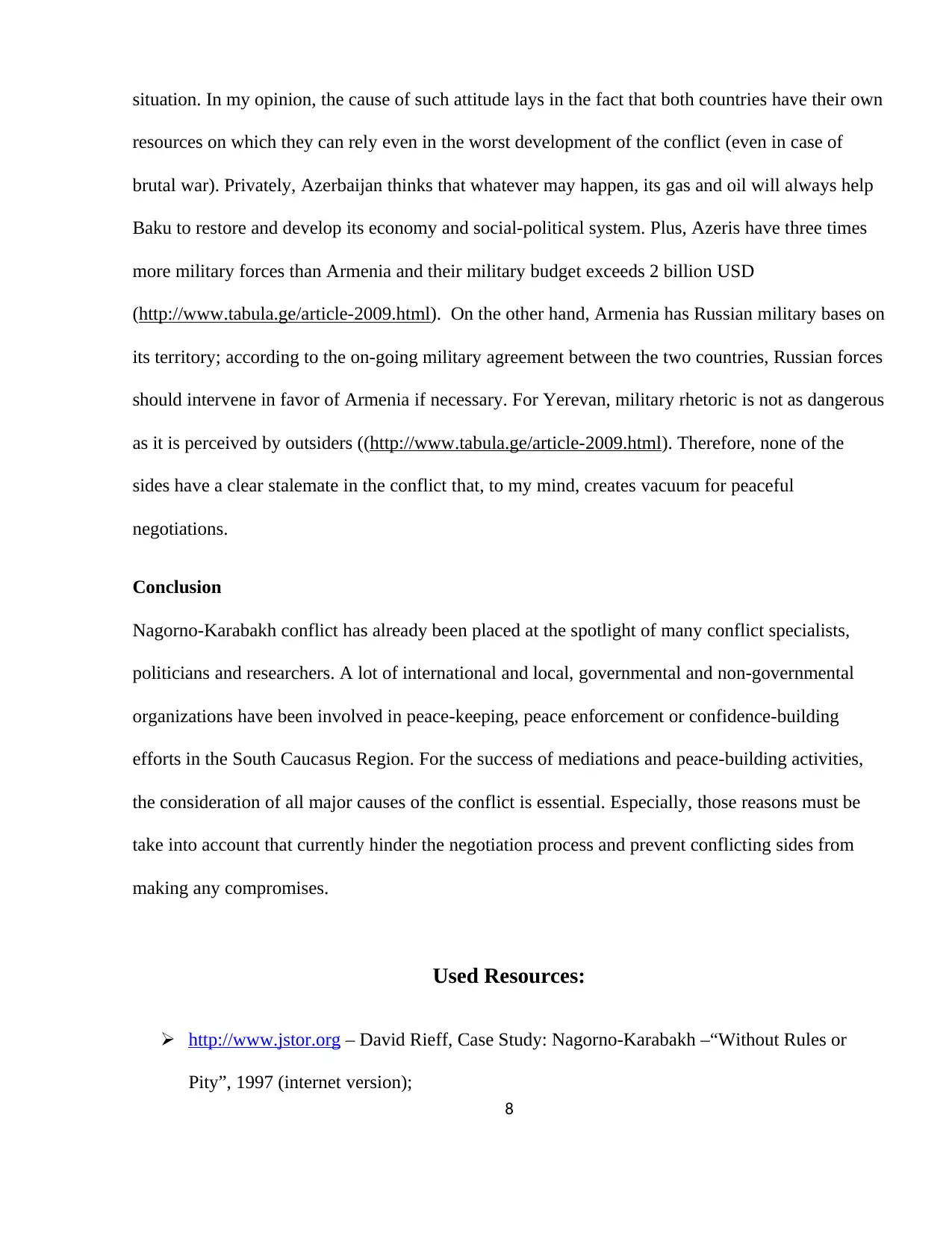
situation. In my opinion, the cause of such attitude lays in the fact that both countries have their own
resources on which they can rely even in the worst development of the conflict (even in case of
brutal war). Privately, Azerbaijan thinks that whatever may happen, its gas and oil will always help
Baku to restore and develop its economy and social-political system. Plus, Azeris have three times
more military forces than Armenia and their military budget exceeds 2 billion USD
(http://www.tabula.ge/article-2009.html). On the other hand, Armenia has Russian military bases on
its territory; according to the on-going military agreement between the two countries, Russian forces
should intervene in favor of Armenia if necessary. For Yerevan, military rhetoric is not as dangerous
as it is perceived by outsiders ((http://www.tabula.ge/article-2009.html). Therefore, none of the
sides have a clear stalemate in the conflict that, to my mind, creates vacuum for peaceful
negotiations.
Conclusion
Nagorno-Karabakh conflict has already been placed at the spotlight of many conflict specialists,
politicians and researchers. A lot of international and local, governmental and non-governmental
organizations have been involved in peace-keeping, peace enforcement or confidence-building
efforts in the South Caucasus Region. For the success of mediations and peace-building activities,
the consideration of all major causes of the conflict is essential. Especially, those reasons must be
take into account that currently hinder the negotiation process and prevent conflicting sides from
making any compromises.
Used Resources:
http://www.jstor.org – David Rieff, Case Study: Nagorno-Karabakh –“Without Rules or
Pity”, 1997 (internet version);
8
resources on which they can rely even in the worst development of the conflict (even in case of
brutal war). Privately, Azerbaijan thinks that whatever may happen, its gas and oil will always help
Baku to restore and develop its economy and social-political system. Plus, Azeris have three times
more military forces than Armenia and their military budget exceeds 2 billion USD
(http://www.tabula.ge/article-2009.html). On the other hand, Armenia has Russian military bases on
its territory; according to the on-going military agreement between the two countries, Russian forces
should intervene in favor of Armenia if necessary. For Yerevan, military rhetoric is not as dangerous
as it is perceived by outsiders ((http://www.tabula.ge/article-2009.html). Therefore, none of the
sides have a clear stalemate in the conflict that, to my mind, creates vacuum for peaceful
negotiations.
Conclusion
Nagorno-Karabakh conflict has already been placed at the spotlight of many conflict specialists,
politicians and researchers. A lot of international and local, governmental and non-governmental
organizations have been involved in peace-keeping, peace enforcement or confidence-building
efforts in the South Caucasus Region. For the success of mediations and peace-building activities,
the consideration of all major causes of the conflict is essential. Especially, those reasons must be
take into account that currently hinder the negotiation process and prevent conflicting sides from
making any compromises.
Used Resources:
http://www.jstor.org – David Rieff, Case Study: Nagorno-Karabakh –“Without Rules or
Pity”, 1997 (internet version);
8

Cornell, Svante. “Small Nations and Great Powers”. 2001. P.84;
http://www.panorama.am/en/politics/2010/07/08/semneby-concerns;
http://www.servinghistory.com;
http://www.livetradingnews.com;
http://www.tabula.ge;
9
http://www.panorama.am/en/politics/2010/07/08/semneby-concerns;
http://www.servinghistory.com;
http://www.livetradingnews.com;
http://www.tabula.ge;
9
⊘ This is a preview!⊘
Do you want full access?
Subscribe today to unlock all pages.

Trusted by 1+ million students worldwide
1 out of 9
Related Documents
Your All-in-One AI-Powered Toolkit for Academic Success.
+13062052269
info@desklib.com
Available 24*7 on WhatsApp / Email
![[object Object]](/_next/static/media/star-bottom.7253800d.svg)
Unlock your academic potential
Copyright © 2020–2025 A2Z Services. All Rights Reserved. Developed and managed by ZUCOL.



